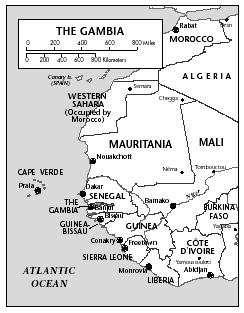The Gambia - Political background
The Gambia was declared a British protectorate in 1888 and gained independence as a constitutional monarchy in the British commonwealth system in 1965. In April 1970, it became a republic with Dawda Jawara as president. In 1981, an attempted coup was successfully thwarted by the Senegalese army. This incident and The Gambia's geographic position led to the establishment of the Senegambian Confederation in 1982. Another consequence of the attempted coup was the establishment for the first time of a Gambian army. The purpose of the Senegambian Confederation was to coordinate defense, foreign affairs, and economic policies (including a trade and customs union). However, The Gambia's lucrative reexport trade over the porous borders with Senegal would have been adversely affected by a trade and customs union, and the Confederation fueled fears of Senegalese domination. Its dissolution in 1989 strained relations between the two countries.
The Gambia under Jawara was one of the few African countries that had maintained civilian rule since independence. However, its multiparty government with a unicameral legislature was dominated by the People's Progressive Party (PPP). Opposition parties claimed that they were prohibited from effectively challenging Jawara. He was reelected to a fifth term in April 1992. After unrest developed in the Gambian army, President Jawara signed a defense agreement with Nigeria that allowed Nigerian officers to head the Gambian army. Despite the presence of Nigerian officers in Banjul, Lieutenant Yahya Jammeh and several other lieutenants succeeded in overthrowing the government in a bloodless coup on 22 July 1994, ending one of Africa's more competitive political systems.
On 11 November 1994, there was an attempted coup led by Lieutenant Basiru Barrow. Rumors of as many as 50 deaths were reported. The United Kingdom (UK), Denmark, and Sweden, in particular, warned their citizens against traveling to The Gambia. This led to an estimated loss of 25% of tourist industry employment. Responding to pressure for a return to civilian rule, Jammeh's Armed Forces Provisional Ruling Council (AFPRC) established a National Consultative Committee (NCC) to review the issue.
The AFPRC reluctantly accepted the Committee's recommendation that the transition period be reduced to two years. The Jammeh regime decreed that no new political parties could be formed until three months before the elections. The suspension of the Constitution and the ban on political parties and political activities also remained in effect. The government decided that a draft Constitution had to be submitted to a referendum before the ban on politics was lifted. However, the AFPRC had formed its own 22 July Movement, which manifested all of the features of a political party and was utilized to contest the elections from an incumbency position. Presidential elections were postponed from July to September 1996.
On 14 August 1996, the ban on political parties and political activities was lifted for all but three pre-coup parties. The People's Progressive Party (PPP) of former president Jawara, the National Convention Party (NCP), and the Gambian People's Party (GPP) were banned for their "participation in 30 years of misrule in the country." The Commonwealth expressed deep concern over the government's decision and indicated that unless the Jammeh regime rescinded it, the Commonwealth could not endorse such a flawed process. In September, the president of The Gambia's

independent electoral commission also called for the release of political detainees.
Having conducted political rallies and organized pre-party activities via the 22 July Movement over a two-year period, the regime's Alliance for Patriotic Re-Orientation and Construction (APRC) gained a significant advantage over the other parties. Jammeh and three civilian rivals contested the presidential elections on 26 September 1996 in a heavily flawed process. Jammeh officially took 56% of the vote, becoming The Gambia's second elected president in 31 years of independence. He was inaugurated 18 October 1996. Elections for the National Assembly were held on 2 January 1997. The APRC took 33 of 45 contested seats, the United Democratic Party took seven seats, the National Reconciliation Party two seats, the PDOIS one seat, and independents took the remaining two seats.
In The Gambia, 1999 and 2000 were marked by intermittent violence, an unsuccessful coup, and charges of state corruption, which elicited tighter controls over the military including its ethnic composition, as well as several cabinet changes by Jammeh. In mid-April 2000, 14 people were killed when students protested the death of a student who had died under suspicious circumstances. Local elections, scheduled for November 2000 were repeatedly postponed. On 18 October 2001 presidential elections were held. Amidst charges of fraud, thousands of Diola (members of Jammeh's ethnic group) living across the border in Senegal voted, and Jammeh was reelected president. Coming in second was Ousainou Darboe of the United Democratic Party (UDP), who had formed a coalition with the People's Progressive Party (PPP) of former president Sir Dawda Jawara, and with the Gambia People's Party (GPP) of Hassan Musa Camara. Jammeh won outright on the first round with 52.96% of the vote. Despite allegations of vote tampering, identity card fraud, multiple voting, vote buying, and other serious irregularities, Darboe—ostensibly in the interest of peace— conceded defeat. The European Union (EU), the Commonwealth of Nations, the United Kingdom, the United Nations (UN), and Transparency International fielded a limited number observers, who said they were relatively satisfied with the election.
Parliamentary elections were held on 17 January 2002 giving the APRC 45 of 53 seats. The PDOIS took three seats; by law, five seats are appointed. Citing elections bias on the part of the Independent Electoral Commission (IEC), the main challenger to the APRC, the United Democratic Party boycotted the elections. APRC candidates ran unopposed in 33 of 48 constituencies. Former head of state Sir Dawda Jawara returned from exile in September 2002 upon condition that he resign from his party, which he has. Given splits within the opposition, Jammeh's party is not expected to face stiff competition in 2003–04.